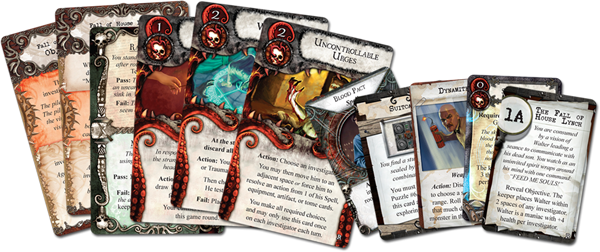On the weekend I played the “Mansions of Madness” board game for the first time. In this Fantasy Flight Games’ board game each player takes control of an investigator exploring a mansion full of cultists and (Cthulhu) Mythos creatures. The game is mission-based and there are about 30 to 40 unique missions. The map of the mansion is tile-based so there’s a lot of variety. One of the players takes the role of the Keeper and controls the investigator’s opponents. Like many other FFG games “Mansions of Madness” has several roleplaying elements, which I like a lot.
 One aspect of the game that I like a lot is how spells are handled. For each spell there is a whole deck of cards, which are the same on the front side, but different on the back side. What you have to do to cast the spell never changes, but the effects vary a lot. The spell I got to use several times was “Wither” (at least I guess that’s what it is called. We played the German version of the game). It’s basically a simple attack spell. But because its effects changed constantly, it was interesting and exciting to use every time. One time it had the additional effect of killing humanoid enemies instantly, another time it caused extra damage but also damaged the sanity of the caster. There were also different outcomes when the roll to cast the spell failed.
One aspect of the game that I like a lot is how spells are handled. For each spell there is a whole deck of cards, which are the same on the front side, but different on the back side. What you have to do to cast the spell never changes, but the effects vary a lot. The spell I got to use several times was “Wither” (at least I guess that’s what it is called. We played the German version of the game). It’s basically a simple attack spell. But because its effects changed constantly, it was interesting and exciting to use every time. One time it had the additional effect of killing humanoid enemies instantly, another time it caused extra damage but also damaged the sanity of the caster. There were also different outcomes when the roll to cast the spell failed.
The way “Mansions of Madness” handled spells got me thinking. Magic is often described as fickle, unpredictable, more art than science, but in most roleplaying games spells always work the same way. Wouldn’t it be cool, if the caster never knew what exactly happens when he or she starts casting? Of course there should be some kind of reliability, but wouldn’t an additional random element not spice things up?
“Mansions of Madness” uses cards for spells, which could work with roleplaying games as well. Alternatively one could create a table for each spell with various effects. This might not work with every game and every genre, but the way this boardgame handles magic is both interesting and fun and perhaps I might use something similar in a future game design. After all, stealing someone’s ideas is the highest form of flattery, isn’t it? 😉


Unpredictable magic was one of the things that really turned me off about Dungeon Crawl Classics. I’m okay with variation, and I’m okay with unreliability, but DCC had way more of both than I could find myself liking.
I’m reasonably comfortable with spells being not entirely reliable, as long as I have some way of predicting what will happen. I think a measure of consistency is important, though. For instance, the core effect of a spell is consistent, but the side effects are variable.
Oh I remember the Wild Magic of AD&D 2nd edition and the table you rolled on. It was fun sometimes, but in out “serious” (as serious as a game is) some of the results were just ludicrous.
Some random elements of magic are ok depending on the genre. For some Sword & Sorcery or CoC game it seems fine, for my Pathfinder game I prefer a more structured magic system. I can add the wonder and unpredictability with the flavor or fluff, but not punish my players with randomness, at least not in the type of game Pathfinder is.
Check out the Dungeon Crawl Classics RPG for a great implementation of exactly the magic system you are talking about. Not only are all spell effects determined by a random table roll, the spells appearance is random (does your magic missile look like ghostly arrows or falming spectral axes?), and failure to cast spell can cause the spell to be lost for the day and corrupt the caster (grow antennae or make one leg longer than the other. Also, every caster rols for a mercurial effect when they learn the spell. A spell rarely manifests exactly the same between two casters. For example, when the caster learns magic missile, they roll for mercurial effect which can be anything from someone the caster knows dies every time the spell is cast or all random effects of a spell check are doubled. There’s more innovation to the magic system beyond this even.
If you want to learn more, listen to Spellburn: Episode #5 of the DCC RPG podcast where the magic system is discussed.
http://spellburn.com/2013/07/10/episode-5-a-mercurial-magic-system/
Erica is my name and i like to let you know that i am not good in writing, but i just have to let the whole world know about something and some one.. who have helped many and including myself.. I want you to know about the truest spell caster WORLD GREATEST SPELL CASTER. He is so true to the core and he has helped me in different ways. please dont be decieved by any one who calls himself a spell caster and cant solve your problems. there are so many scammers online.. be guided. WORLD GREATEST is someone who has been tried and tested and he has proven that he is really the World Greatest. for any problems whatsoever, contact [Editor’s note: email adress redacted] and i am 100% sure that the problem will be solved. OK. really a trial will convince you.
I usually move comments like these to spam, but I found it mildly amusing. Please note that there are no such things as magic in the real world. 😉